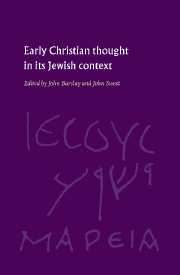Book contents
- Frontmatter
- Contents
- List of contributors
- Preface
- List of works by Morna D. Hooker
- List of abbreviations
- Chapter 1 Introductory Essay
- I THE SOCIAL CONTEXT OF EARLY CHRISTIANITY
- II SOME EARLY CHRISTIAN SOURCES
- III SOME EARLY CHRISTIAN THEMES
- Chapter 14 ‘In accordance with the Scriptures’
- Chapter 15 Land, sanctuary and worship
- Chapter 16 Monotheism and christology
- Chapter 17 Apocalyptic, God and the world.
- Chapter 18 Atonement and martyrdom
- Chapter 19 Halakhah and ethics in the Jesus tradition
- Index of names
- Index of subjects
- Index of texts
Chapter 17 - Apocalyptic, God and the world.
from III - SOME EARLY CHRISTIAN THEMES
Published online by Cambridge University Press: 22 September 2009
- Frontmatter
- Contents
- List of contributors
- Preface
- List of works by Morna D. Hooker
- List of abbreviations
- Chapter 1 Introductory Essay
- I THE SOCIAL CONTEXT OF EARLY CHRISTIANITY
- II SOME EARLY CHRISTIAN SOURCES
- III SOME EARLY CHRISTIAN THEMES
- Chapter 14 ‘In accordance with the Scriptures’
- Chapter 15 Land, sanctuary and worship
- Chapter 16 Monotheism and christology
- Chapter 17 Apocalyptic, God and the world.
- Chapter 18 Atonement and martyrdom
- Chapter 19 Halakhah and ethics in the Jesus tradition
- Index of names
- Index of subjects
- Index of texts
Summary
Second Temple Judaism had an ambivalent relationship with culture. Even when its adherents found themselves in positions of influence, there remained a reserve towards contemporary political arrangements which, however widespread assimilation may have been, prevented Jews from being readily assimilated into the Roman imperium (Tcherikover 1970). Ethnicity and religion intertwined in such a way that it proved impossible for Jews to merge imperceptibly into the cosmopolitan culture of the ancient world and for their religion to become just another aspect of the Roman hegemonic ideology (however much some would have liked to have made it so). Early Christianity continued that ambivalence, and even if it was largely detached from an early stage from the emerging halakhic consensus of rabbinism, it maintained that characteristic reserve towards the demands of political and social culture.
For both Judaism and Christianity a means of enunciating that reserve and the culture of resistance that was at times required was facilitated by apocalypticism. Even an apocalypse like Daniel, where the vision of hope sits side by side with legends of involvement of Jews in the life of a court of a foreign potentate, evinces a clear sense of the importance of the limits of compromise and the alternative horizon offered by worship and religious practice. For all its hints of imperial approval the book of Daniel provides evidence of the necessity of boundaries of social conformity and a language in which the critique of empire can be maintained (Bauckham 1991; Rowland 1988).
- Type
- Chapter
- Information
- Early Christian Thought in its Jewish Context , pp. 238 - 249Publisher: Cambridge University PressPrint publication year: 1996
- 1
- Cited by



